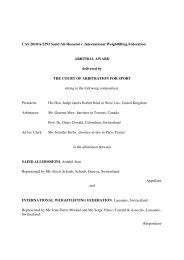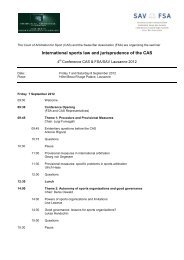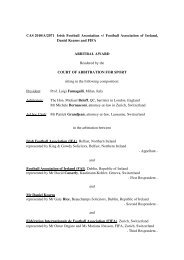(CAS) Bulletin - Tribunal Arbitral du Sport / TAS
(CAS) Bulletin - Tribunal Arbitral du Sport / TAS
(CAS) Bulletin - Tribunal Arbitral du Sport / TAS
Create successful ePaper yourself
Turn your PDF publications into a flip-book with our unique Google optimized e-Paper software.
athletes in the Olympic Games, the provisions of [Rules 26<br />
and 28 of the Olympic Charter] do not vest any authority<br />
whatsoever in the NOCs which permit them to determine<br />
or co-determine the [...] expulsion of a national association<br />
by its IF. This does not prohibit the NOC from making a<br />
recommendation to the IF [...], but the IF is not required to<br />
follow such recommendation”.<br />
However, it is not necessary for the Panel to decide<br />
upon this issue in the present matter. Even if the<br />
Resolution was not based upon the expulsion from<br />
the COC as such, but – additionally or exclusively –<br />
on the reasons given in the COC’s letter (mainly: a<br />
“vast majority” of Croatian golf clubs allegedly having<br />
left the Appellant and the Appellant’s alleged inability<br />
to manage Croatia’s golfi ng activities), the Resolution<br />
is invalid <strong>du</strong>e to a blatant violation of the Appellant’s<br />
right to be heard.<br />
The right to be heard is a fundamental and general<br />
principle which derives from the elementary rules of<br />
natural justice and <strong>du</strong>e process (see, for example, <strong>CAS</strong><br />
OG 96/005, para 7; <strong>CAS</strong> 2001/A/317, para. 6). <strong>CAS</strong><br />
has always protected the principle audiatur et altera<br />
pars in connection with any proceedings, measures<br />
or disciplinary actions taken by an international<br />
federation vis-à-vis a national federation, a club or<br />
an athlete (<strong>CAS</strong> 98/200, para. 58 with numerous<br />
references to <strong>CAS</strong> jurisprudence; see also <strong>CAS</strong><br />
2004/A/777, para. 20 with further references).<br />
There is no doubt that the right to be heard is a legal<br />
principle which has to be respected by federations<br />
when making their decisions and within their<br />
internal proceedings (see <strong>CAS</strong> 91/53, in REEB M.<br />
[ed.], Digest of <strong>CAS</strong> Awards 1986-1998, p. 79, 86 et seq.;<br />
<strong>CAS</strong> 2001/A/317, para 6) such as the Appellant’s<br />
expulsion from the EGA.<br />
As already mentioned above, it is doubtful whether<br />
Article 16 para. 3 of the EGA Constitution can be<br />
applied in the present case in view of the Appellant’s<br />
right to be heard. However, even if this were the<br />
case and even if the letter from the COC contained<br />
information which would meet the “urgency”<br />
requirement in Article 16 para. 3 of the EGA<br />
Constitution, the Appellant’s right to be heard would<br />
at the very least have required the EGA Respondent<br />
to immediately inform the Appellant (and the other<br />
members) that the EGA deemed the information<br />
received from the COC to be relevant for a possible<br />
expulsion of the Appellant at the AGM 2010. This<br />
course of action would have allowed the Appellant<br />
to prepare its defence against the Resolution, which<br />
is quite obviously of crucial importance to its future,<br />
and enabled the other members to consider the issue.<br />
The letter from the COC is dated 16 September 2010.<br />
Absent any evidence on record or any submission by<br />
the Respondent to the contrary, there is no reason<br />
to consider that the Respondent did not receive the<br />
COC’s foregoing letter well in advance of the day on<br />
which the AGM 2010 took place.<br />
Consequently, the Panel fi nds nothing that justifi es<br />
the EGA having waited until the eve of the AGM<br />
2010 before informing the Appellant, let alone its<br />
refusal to provide the Appellant with the relevant<br />
documents on that occasion and at the AGM 2010<br />
itself.<br />
In particular, the Panel fi nds that the letter from the<br />
Ministry of Science, E<strong>du</strong>cation and <strong>Sport</strong> which the<br />
Respondent, according to its Answer, received on 13<br />
October 2010, does not constitute such justifi cation.<br />
First of all, even if this letter did in fact, as submitted<br />
by the Respondent, confi rm the legality of the COC’s<br />
decision to expel the Appellant (which the Panel<br />
fi nds highly doubtful, see above), the question would<br />
remain whether the Appellant’s expulsion from the<br />
COC could per se justify the Resolution in light of<br />
the <strong>CAS</strong> jurisprudence mentioned above. Because<br />
only then would the Ministry’s letter have contained<br />
relevant information with regard to the Resolution.<br />
However, the questions raised in the previous<br />
paragraph can be left open. Given that the AGM 2010<br />
was at best one month ahead when the Respondent<br />
received the COC’s letter, time was of the essence in<br />
order to provide the Appellant with the opportunity<br />
to prepare its defence. The Respondent was therefore<br />
obliged to inform the Appellant immediately upon<br />
receipt of any information which could later form<br />
the basis for a resolution to expel the Appellant.<br />
Waiting for a confi rmation of any sort could not<br />
discharge the Respondent from this obligation<br />
given the fundamental importance of the right to be<br />
heard. Also, immediate notifi cation would not have<br />
hurt any reasonable interests of the Respondent. If<br />
the sought-after confi rmation would not have been<br />
received before the AGM 2010, the Respondent<br />
could have decided either – if it deemed the available<br />
information suffi cient – to nonetheless take a vote<br />
on the Appellant’s expulsion or – if it deemed the<br />
confi rmation a conditio sine qua non for the expulsion –<br />
to postpone the vote once again.<br />
Hence, in view of the fact that the Resolution was<br />
(at least inter alia, if not exclusively) based on the<br />
information contained in the letter from the COC,<br />
the Respondent was obliged to immediately notify<br />
the Appellant thereof. The outstanding confi rmation<br />
from the Ministry did not justify the Respondent’s<br />
Jurisprudence majeure / Leading cases<br />
-<br />
99





